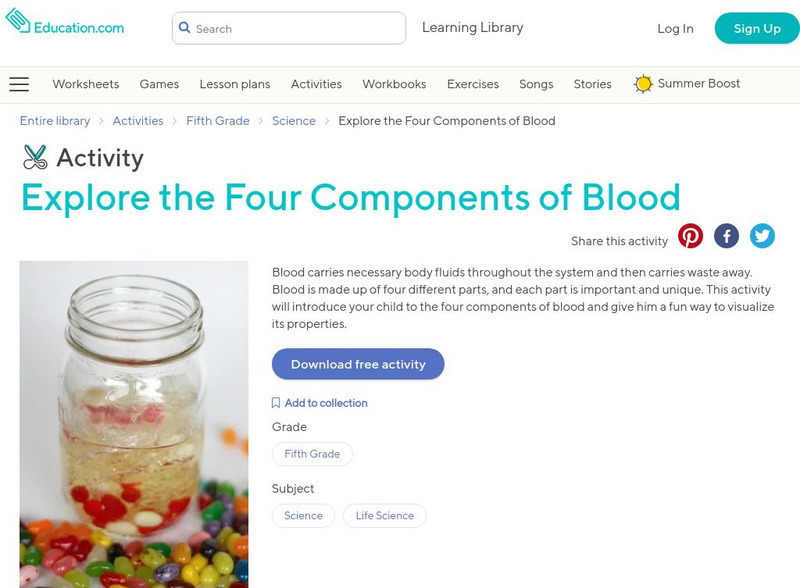Hi, what do you want to do?
Give and Let Live
Blood and Transplant: Blood
Why is blood donation so important, anyway? Science and health classes across multiple grades benefit from an in-depth look into the need for and process of blood donation. With an emphasis on presenting the topic in a non-threatening...
Curated OER
Making Blood
Fifth graders review the components of blood and write four things they have learned. They view a videodisk related to blood components and create a batch of candy "blood" using terminology including platelets, red blood cells, white...
Curated OER
P.L.E.P: Parts of Blood
Young scholars examine the different parts of blood. In this human blood lesson students work in groups and identify parts of blood and construct a model of human blood.
Curated OER
Donating Blood
Students examine the facts of blood and discuss the different parts of blood and their function. They discover different people have different blood types and where they can go to donate blood.
Curated OER
Life in a Blood Vessel
Students explain the various activities that are constantly going on in a blood cell by role playing a blood cell, antibody, pathogen, and platelets.
Curated OER
Making Blood!
Ninth graders study facts about human blood and what it is made of. In this blood composition lesson students divide into groups and complete several activities.
Curated OER
Highways of Life
Students explore the circulatory system. They participate in media activities to explore blood flow and identify the parts of the circulatory sytem. Students create a model of the circulatory system.
Curated OER
Making Blood
Fifth graders review what they have already gathered about human blood. After reviewing the components of blood, they work together to make their own. Using the internet, they complete a blood web hunt and share their discoveries with...
Curated OER
Blood Web Hunt
Fifth graders examine the components of blood. Using internet websites and a handout, 5th graders search for answers to questions about blood. They explore components such as red blood cells, white blood cells, platelet and plasma.
Curated OER
What's Your Type
Students record their blood types on a class graph and calculate the potential number of blood donors for each group.
Serendip
Homeostasis, Negative Feedback, and Positive Feedback
So many bodily activities depend on homeostasis! Give learners a solid background to understand the basic process of the human body. Scholars first examine negative feedback loops contributing to body temperature regulation and then a...
Curated OER
Circulatory System Design
Learners identify the different parts of the circulatory system and their function. They work together to create their own model of the system and use it to determine the rate of blood flow. They answer questions related to their model.
Curated OER
Operating the spectrophotometer
Working in small groups, learners explore the operation of spectrophotometer. Using the spectrophotometer, they investigate Beer's Law with everyday items.
Education.com
Education.com: Make Plasma Soup and Explore the Components of Blood
[Free Registration/Login Required] Allow students to visualize blood and its components by making this plasma soup. Discuss plasma, red blood cells, white blood cells, and platelets with this model of blood.
Other popular searches
- Low Blood Platelets
- High Blood Platelets
- Normal Blood Platelets
- Blood Platelets Lupus
- Blood Platelets Pt


















